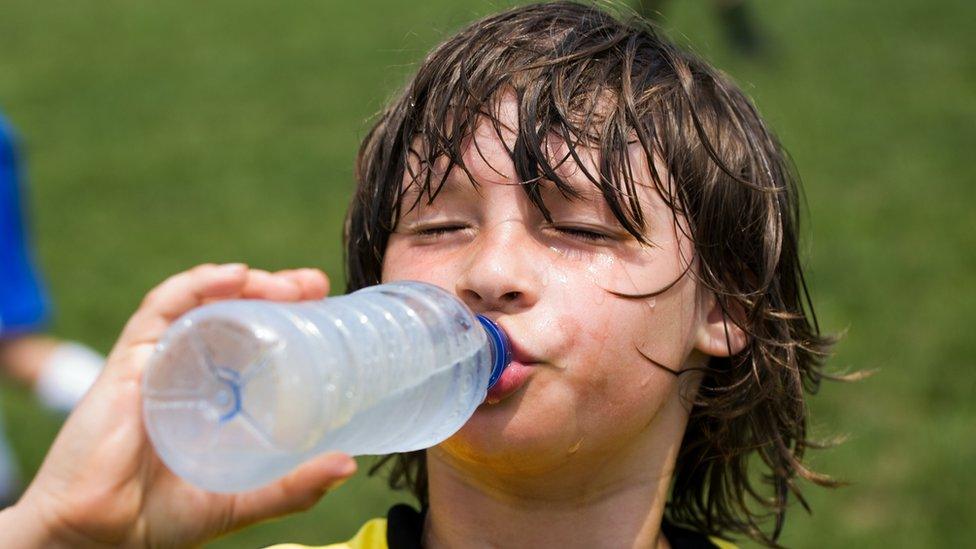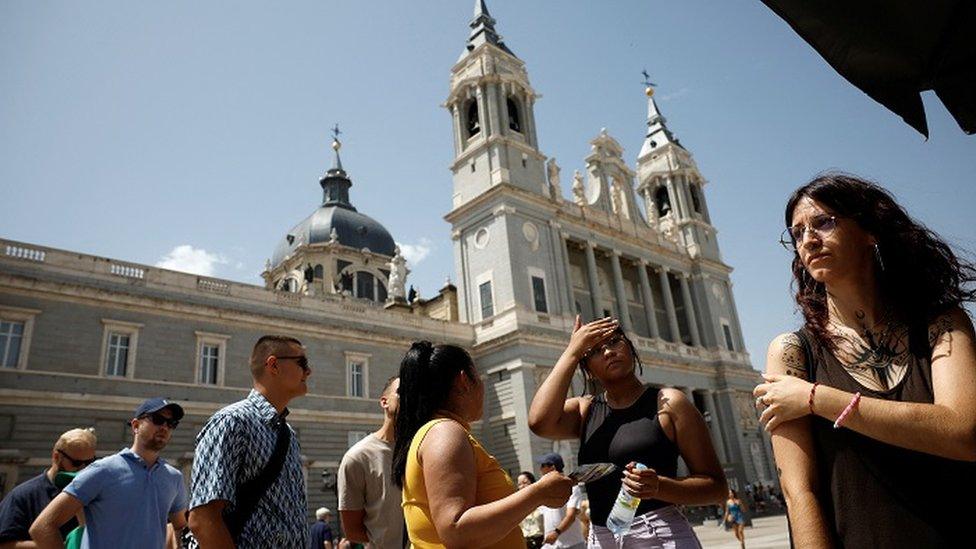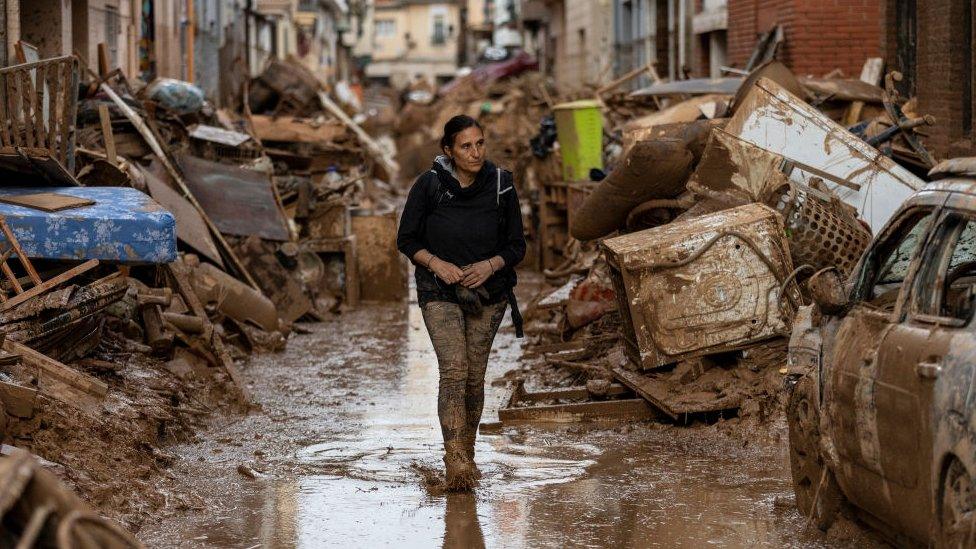How to manage your holiday in a heatwave
- Published
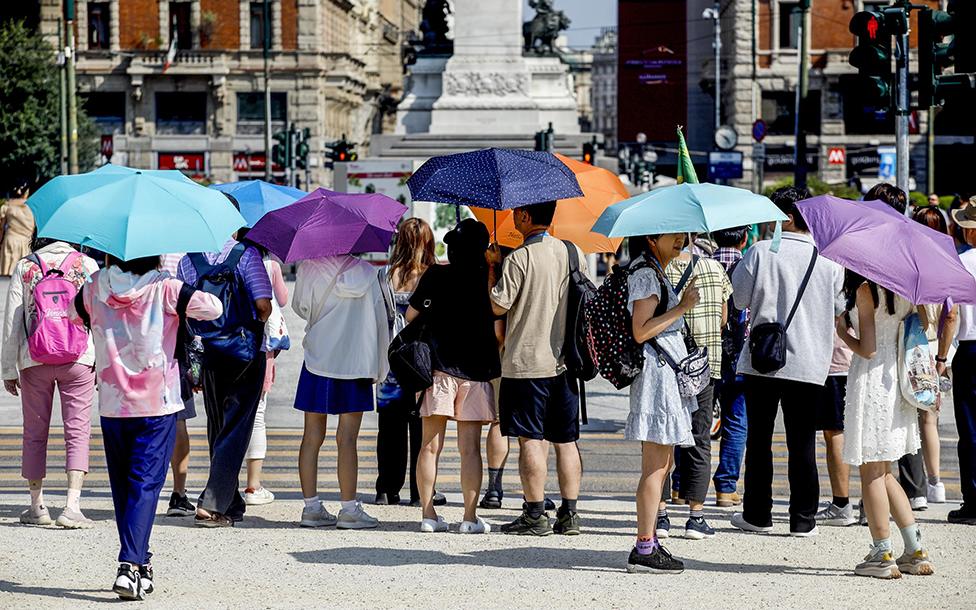
Milan has seen high temperatures along with much of southern Europe
Europe and the US are sweltering with temperatures reaching highs of 49C (120F) in some places.
As Italy, Spain and Greece are facing many more days of extreme heat, here's what you need to know if you're booked on a holiday in a heatwave.
Is it safe to travel to Europe?
If you're worried, you should check Foreign Office advice before travelling and ensure everyone travelling is covered by your insurance. Currently, there are no Foreign Office travel warnings related to the weather.
The Association of British Travel Agents (ABTA) says flights and holiday packages are continuing as normal. On its website, ABTA has a checklist, external with six general steps holidaymakers can take to prepare for their trip. It includes advice such as making sure you have a valid Global Health Insurance Card (GHIC) or European Health Insurance Card (EHIC) with you - although experts say travellers should still take out travel insurance as the cards do not cover everything, such as repatriation.
Will I get a refund if I cancel my holiday because of the heatwave?
Martyn James, a consumer rights expert, said in most cases holidaymakers would not get quick refunds if they decided against travel. But there are circumstances where money could be claimed back depending on how and when the holiday was booked, what type it is, and the insurance.
Those who are already on holiday would have more chance of claiming partial refunds - if conditions are so bad that your health has been affected, your insurer may cover your early departure through its "curtailment" clauses.
However, getting money back if you cancel before departure would depend heavily on your insurance, and your own personal circumstances. Policies do not cover a "disinclination to travel", Mr James said, unless there is a valid or official reason.
He said that many insurers use official guidance as the "watermark" to honour the costs of cancellations. "As soon as official guidance says it is dangerous to travel, that is when the 'curtailment' clauses for refunds kick in," he said.
Are heatwaves covered by travel insurance?

Most policies have clauses covering "extreme" or "severe" weather, but the definitions are not often clear and focus on hurricanes or other such natural disasters rather than heatwaves. However, there may be grounds to not travel.
Rory Boland, editor of Which? Travel, said: "If you have a medical condition that makes you particularly vulnerable to the heat and is covered under your travel insurance policy, you might be able to make a cancellation claim on this basis, but it would help your case to have a medical professional's opinion about your fitness to travel."
Mr James added: "It would be much more preferable to the insurer to cover the cost of a holiday, rather than pay huge hospital bills should you fall ill once you travel.
"I would suggest you open up your insurance PDF, hit CTRL + F and search for 'extreme' or 'severe weather', and see what is there."
What if my holiday is cancelled by the operator or hotel?
You will be covered for most situations where services are cancelled by the operator. Package holidays have more cover from trade bodies in this respect, says Mr James.
I booked a package holiday and some elements were cancelled due to heat. Can I claim?
Package holidays have more protection than direct bookings, says Mr James. You may be able to claim back from the travel company for things like missed excursions, or closed amenities such as swimming pools due to the heatwave.
Mr Boland: "If paid-for events and activities are cancelled because of the heatwave while you're on holiday and you can't recoup your money from the providers, you may also be able to claim for these costs from some insurers."
The best option is to check with your holiday provider, he added.
I can't get a refund, but I don't want to go. Is there anything else I can do?
Mr James said there are some possible solutions. Package holidays may give you the option to move the dates, possibly for a fee, or even transfer them into someone else's name. Perhaps there is an option to move the holiday over to next year, although he noted that the effects of the pandemic on travel had made these types of options far more strict.
"There are options," said Mr James. "But ultimately you have to think about what you would be prepared to compromise on."
Do I need to change my plans while on holiday because of the heat?
Be sensible about what activities you choose. A big, exposed hike to visit a tourist landmark might be ill-advised. Limit physical exertion and listen to your body.
Some places may close because of the heat - a few days ago Greece closed its famous Acropolis during the hottest hours of the day to protect visitors.
How to stay safe in intense heat

In the UK, we're used to a hot summer with temperatures regularly breaking records. But this heatwave in Europe and parts of the US is on another level.
So it's important to take steps to stay safe in the extreme heat.
Drink plenty of water to stay well hydrated and don't drink too much alcohol.
Use sunscreen with a high SPF and UVA rating, seek out shade when and where you can, and take advantage of places with air-conditioning. Carrying a handheld fan and a water spray can provide some relief too.
If you are out and about, wear light and airy clothing. Natural fabrics such as linen and cotton that let air circulate are best. These can absorb sweat and moisture, helping you to cool down.
What are the indicators of heat exhaustion, stroke and dehydration?
Heat exhaustion happens when your body is becoming too hot and struggling to regulate or cope. It can affect anyone, including fit and healthy people.
Signs of heat exhaustion include feeling faint or dizzy, excessive sweating and muscle cramps. Heat exhaustion is not normally serious if you can cool down within half an hour. If it turns into heatstroke it needs to be treated as an emergency. It means your body can no longer manage the heat and your core temperature is rising too high. Get urgent medical help.
The signs to watch out for and quickly act on:
feeling unwell after 30 minutes of resting in a cool place and drinking plenty of water
not sweating even while feeling too hot
a body temperature of 40C or above
fast breathing or shortness of breath
feeling confused
a fit (seizure)
loss of consciousness
not responsive
Heat exhaustion can come on quickly, over minutes, or gradually, over hours. The symptoms are your body's way of warning you to cool down, fast.
How to treat heat exhaustion
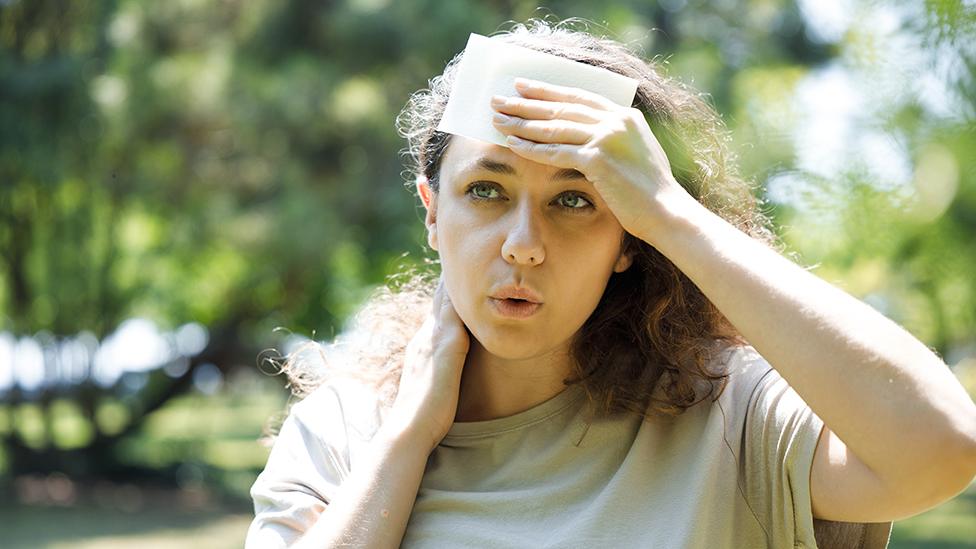
If someone has heat exhaustion:
get them to rest in a cool place - such as a room with air conditioning or somewhere in the shade
remove any unnecessary clothing, to expose as much of their skin as possible
cool their skin - use whatever you have available, a cool, wet sponge or flannel, spray water, cold packs around the neck and armpits, or wrap them in a cool, wet sheet
fan their skin while it is moist - this will help the water to evaporate, which will help their skin cool down
get them to drink water - sports or rehydration drinks are fine too
Stay with them until they are better.
They should start to cool down and feel better within 30 minutes. If in any doubt, seek help.
How to get a good night's sleep
Use thin sheets, cool your socks in the fridge before putting them on and stick to your usual bedtime routine, experts say.
Why is there no extreme heat in the UK?
The jet stream is stuck in one position dividing the north and south of Europe.
Above the jet stream (where the UK is), cooler Arctic air is blowing in with areas of low pressure giving spells of rain. Underneath, hot air is coming from north Africa - both are blocked from travelling up or down.

How is the heatwave affecting you on holiday? You can share your experiences by emailing haveyoursay@bbc.co.uk, external.
Please include a contact number if you are willing to speak to a BBC journalist. You can also get in touch in the following ways:
WhatsApp: +44 7756 165803
Tweet: @BBC_HaveYourSay, external
Please read our terms & conditions and privacy policy
If you are reading this page and can't see the form you will need to visit the mobile version of the BBC website to submit your question or comment or you can email us at HaveYourSay@bbc.co.uk, external. Please include your name, age and location with any submission.
